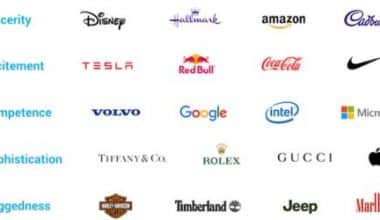It’s important for your career that you learn how to brand yourself. It’s important to find your niche, your unique voice, and an effective way to present yourself in the market, whether you’re looking for a new job or trying to build your reputation in your chosen field. In other words, if you want to learn how to market yourself well, learning about self-branding can be helpful. So read on to learn more about branding yourself, how to brand yourself with social media, and quotes about branding yourself, and their importance.
Branding Yourself
Branding yourself refers to the act of creating a name for yourself or your company. As its name suggests, this is a brand for you or your business. It’s how you show the world your brand and what it stands for, and make sure your target audience knows who you are, what you stand for, and why they should choose you over your competitors. Branding oneself is more than simply marketing yourself; it also entails becoming your own marketer. It entails taking a stand for yourself and your company so that your colleagues and clients respect and trust you. When talking about businesses, the word “branding” can have a bad connotation. But if you use the right principles and strategies, you’ll be able to give your business a brand identity and stand out from the competition.
How to Branding Yourself
Once you’ve started working on branding yourself, getting feedback and making sure your brand matches your personal brand statement will help you improve. Many people have had a lot of success with personal branding, but if you don’t have a personal branding statement, it can be hard to know when you’ve been successful. To improve your personal brand, you need to know how to go about branding yourself:
#1. Define Your Brand and Become an Expert
Take some time to think about yourself and figure out who you are and what your brand is. Use words like collaborative, resourceful, flexible, forward-thinking, connected, visionary, diplomacy, straightforward, accurate, enterprising, ethical, genuine, and/or accessible to describe your persona, culture, and outlook. Focus on becoming an expert in your field if you want to get the attention of the media, bring in new clients, or grow your business. Don’t become an expert in something that has nothing to do with your mission, goals, or vision. It will not benefit you in any sense.
For instance, if you know a lot about corporate tax accounting, it might not be a good idea to start branding yourself as an expert in personal finance. Still, keep in mind that people want to hear about your work, but they also want to get to know you as a person. Don’t be afraid to bring your personality into the conversation.
#2. Establish a Presence.
Friends, coworkers, and potential customers will Google your name, so make sure that branded content is what they find. One way to do this is to set up a simple website or blog that people can find online.
For instance, you can buy your full name as a domain name (yourfullname.com). By creating a static website or a blog under your domain name, you will own the top spot in Google and other search engines for your name. This should be a separate website from the one for your business. Add your photo, a bio, your email address, and links to the rest of your presence after acquiring your domain name (Facebook, LinkedIn, Twitter). So, people can contact you in whatever way they prefer. Don’t let anyone else claim your name before you. Even though search engines will find your social media pages, having your own domain will give you a better idea of where you stand.
#3. Generate Brand Awareness Through Networking.
You should connect with other young accounting professionals through social networks and leave comments on their blogs. One of the best ways to get known in your field is to make connections with other people. By getting to know the people in your audience, you can help your business and brand grow over time.
#4. Remember the 3 CS of Branding.
Clarity, consistency, and constancy. Know who you are and who you are not. Don’t sugar-coat your qualifications. Share your brand through all forms of communication. Figure out where you want to fit in (industry and niche area of expertise), and then stay visible to your target audience.
#5. Get Feedback From the People Who Know You Best, at Work, at Home, or Anywhere Else.
The reputation you have in the hearts and minds of others is the ultimate measure of your brand. Observe how they introduce you to other people. Ask them what they like most about your brand and what your main strengths are. If they can tell you right away, you’ve done a good job of branding yourself.
Branding your company isn’t enough anymore. As a business professional, the world is eager to hear what you have to offer. Finding your brand may seem like a lot of work, but your hard work will pay off in a big way. Your unique brand message emphasizes the finest things you have to offer, shows what it’s like to work with you, and explains how you get things done.
Branding Yourself With Social Media
Branding yourself through social media can cut through the noise and help you stand out to your target market, increasing your chances of generating more business, leads, and sales. But how do you really do that?
#1. Dig Deep to Determine Your Brand Persona
Sharing your knowledge, personality, and passion in a way that adds value to people’s lives is what branding yourself on social media entails. You won’t be successful on social media if you don’t know your unique selling proposition and what qualities you have to offer. Finding your area of expertise should therefore be your first step when branding yourself with social media. Think long and hard before you speak; this will shape your self-branding for years to come.
It’s not enough to say that you’re a superstar marketer or a yoga master; once you’ve identified the aspects of yourself that you can use to create your own brand, focus on a particular area.
It will be necessary for you to be one of the following: a rockstar marketer for female solopreneurs, an expert on pregnant yoga, or an aerial yoga instructor. If you’re unsure of your area of expertise, attempt to recall the questions that people have asked you for help with in the past.
#2. Speak to Your Audience in Their Voice
The following step is to determine who you want to reach out to when branding yourself with social media. Ask yourself what kind of language they use, what’s most important to them, and how they feel about some key issues. This will help you find the right kind of content, tone, and topics to connect with them. Just make sure you’re not just copying your audience, or it will sound fake. When you try to be like your audience, bad things can happen. It can make people laugh at what they love. So find a way to give value to your audience where they want it. Take the lead.
#3. Invest Your Time in Specific Channels (Ditch the Rest)
If you try to be on all of the top platforms, you’ll be exhausted in a day, so choose carefully. The most important rule in branding yourself with social media is to think about who you’re writing for
#4. Decide Between Page & Profile
If you use Facebook, you’ll have to decide whether you want to run a Facebook Page or a Facebook Profile. A page gives you more power, gives you useful analytics, lets you run ads, and lets you post business-related content. But a profile is warmer and more personal. It’s easier to follow a profile account, and you can reach more people with a profile account. With a Page account, you can’t join a group. Most of the time, it’s best to start with a profile account to build a community and make connections, and then add a page when you have a big enough base. But it’s up to you.
Quotes About Branding Yourself
There is a great deal more to branding yourself. The following quotes are meant to encourage you to focus on what sets you apart from others so that you can cultivate long-lasting client relationships and grow your company.
- “People do not buy goods and services. They buy relations, stories and magic.”
-Seth Godin
- “Build a lifestyle around your brand, and the audience will follow.”
-Eva Chen
- “If you don’t share your ideas, no one will know if they’re any good.”
-Dorie Clark
- ”Branding demands commitment; commitment to continual re-invention; striking chords with people to stir their emotions; and commitment to imagination. It is easy to be cynical about such things, much harder to be successful.
-Sir Richard Branson
- “If you try to resonate with everyone, you will resonate with no one.”
-John Lee Dumas
- ‘‘All of us need to understand the importance of branding. We are CEOs of our own companies: Me Inc. To be in business today, our most important job is to be head marketer for the brand called You”.
-Tom Peters in Fast Company.
Importance of Branding Yourself
A successful brand promotes itself, creates a unique experience, builds loyalty, and keeps the quality of the service it provides consistent. Brands are also used to connect with people around the world. The importance of branding yourself includes the following:
#1. You’ll Be an Expert in Your Field
The importance of branding yourself is to acknowledge your expertise, as most people don’t know who you are or what you do. Branding is mainly about what you sell, not who you are. If you don’t impress a client with your expertise, they’ll choose someone else. If a client knew your name but not your service quality, it would be inconvenient. You’ll be mediocre without something to distinguish you.
#2. Become an Asset
If you’re a freelance designer, it’s a good idea to invest in something unique that people respect. By making a name for yourself, you become the asset, and your set of skills or services becomes the product you sell. No one can take away the fact that you are your own unique product. Your business and your skills and experience will be worth more if you set yourself up to be an asset. When you’re the asset, your business is based on you, so you can’t be replaced. People will know who you are and, more importantly, what you do.
#3. Be a Memorable Force
When companies play annoying TV and radio ads over and over again, they aren’t trying to sell you something right then and there. Instead, they do this so that when you go to a department store, the first thing you think of is their brand. As long as you buy their brand, it doesn’t matter which line of products you choose. When it comes to branding yourself, it’s the same idea. If your brand can reach and persuade potential clients, when they open their browser or need a certain project done, the first thing that comes to mind is your brand. Having an easy-to-remember name for your freelance business is a plus.
#4. Stand Above the Rest
What defines a brand are the services or products it stands for. For instance, what would WordPress be without its services for managing content? Nothing more than a catchy name. To make a brand that stands out, you need to come up with an image that matches what the brand has to offer. The image you choose to represent your brand should be simple, clear, and show what you or your business does. You should use color theory to make your logo creative and stand out with the colors you choose.
How Would You Brand Yourself?
Focus on what makes you unique and come up with a vision and mission that support your professional goals to start building your personal brand. A strong personal brand can help you show your audience how knowledgeable you are and set you apart from your competitors.
What Are the 5 C’s of Personal Branding?
The 5 C’s of creating your personal brand: are clarity, content, connections, creativity, and community.
What Are the 4 Pillars of a Personal Brand?
To begin, divide personal branding into four major categories: identity, social, online, and career.
Why Is Branding Yourself Important?
A successful business strategy includes branding yourself. It enables you to interact with customers authentically and establish yourself as an industry expert. Joining an awards program can help you build a personal brand that your consumers will value.
What Are the 3 P’s of Branding?
Promise, Positioning, and Performance
Start by focusing on the three basic parts of a brand: promise, positioning, and performance. These elements are known as the “three brand Ps.






